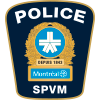
Fraud - the GUICH
The officers of the Service de police de la Ville de Montréal (SPVM) want parents to know that a type of fraud targeting primarily young people has just been updated.
WHAT is it?
This scam, nicknamed the GUICH (from guichet, the French word for ATM), consists of a suspect who typically makes contact with a victim—usually a minor or vulnerable person—through social media or in a public place.
Suspects tell their victims they could earn fast cash without risk. They tell the victim that all he/she needs to do is give them access to their bank account for a transaction in exchange for financial compensation.
There are different approaches to this scam. In some cases, the suspect will convince the victim to send his/her banking and personal information in order to make fraudulent transactions using his/her account. In other cases, the suspect will simply ask for the victim’s card and personal identification number (PIN) in exchange for cash.
It is important to know that people who give their banking information to someone else, for money or not, could face the following consequences:
- Potential criminal charges as an accomplice to fraud
- Obligation to reimburse defrauded amounts to the financial institutions*
- Stained record with the financial institution for fraudulent use of a bank account
* In the case of a minor, the parents may be held accountable for paying back the funds.
PREVENTION TIPS
- Ask your child if he/she has opened a personal account with a financial institution without your knowledge. Note that, depending on your child’s age, a parent’s consent and signature are not necessarily mandatory based on the financial institution. However, in the event of loss or fraud, you remain entirely accountable whether you have consented to the account or not.
- Make your child aware of the potential consequences of sharing their personal information, bank card and PIN with someone. In case of undue pressure, ask your child to speak up.
- Contact your neighbourhood police station if ill-intentioned people have approached your child, so as to notify the authorities as soon as possible.
- Discuss with your child the prevention tips usually offered by financial institutions, namely:
- Never disclose your personal information and PIN
- Cover your PIN when using your debit or other payment cards
- Check your bank statement regularly; if you see any unusual transactions or fees, contact your financial institution
- Beware of offers and fast cash solutions—in all likelihood, these are scams
- Feel free to tell your child real cases that have made the news:
“Want to make some fast money?” a Châteauguay teenager was asked last spring. He accepted the offer. In the end, he lost $800 and got himself into trouble. And he is not alone[1].
FOR HELP OR TO REPORT A FRAUD
If you suspect or know that your child is a victim of debit card fraud, report the incident to your neighbourhood police department and promptly contact your financial institution.
Contact the Canadian Anti-Fraud Centre to report the fraud. Dial 1-888-495-8501 or online.
You can also report the fraud or any other criminal activity anonymously and confidentially to Info-Crime Montréal by dialling 514-393-1133 or online.
You can also contact the two national credit rating agencies and ask that a fraud alert be added to your credit file[1].
- Equifax Canada: 1-800-465-7166
- TransUnion Canada: 1-877-713-3393
[1] There may be applicable fees for certain services offered by these agencies.
On the same topic:
Debit Card Fraud



